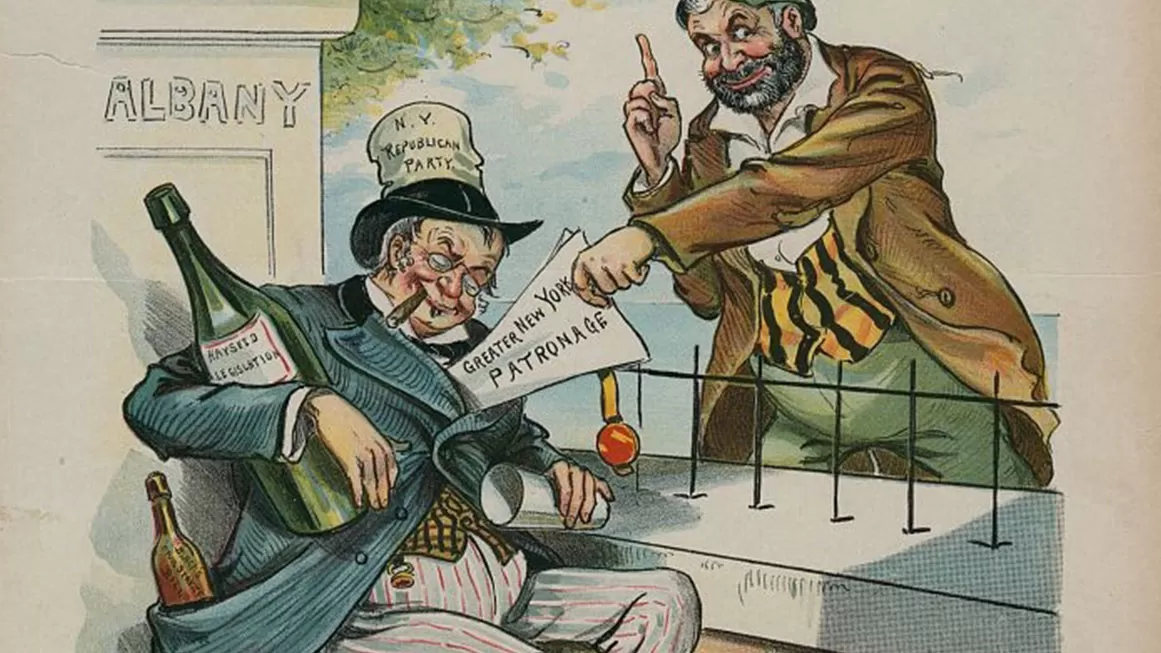1. Peter Suderman, “The Bad Law that Made Good Bars,” Reason, November 2023.
Excerpt:
The previous system, Raines said, was understood to be corrupt, as it relied on discretionary licenses and a host of largely unenforced provisions. In addition to taxing saloons, the Raines Law imposed new rules about when, where, and to whom they could serve alcohol. It raised the drinking age to 18, restricted sales “in the vicinity of public institutions” such as asylums, and prohibited alcohol sales on Sundays or on any day between 1 and 5 a.m.
There was, however, an exception to the ban on Sunday sales: hotels, which could sell liquor to guests with their meals. To be classified as a hotel, a place of business had to have at least 10 rentable rooms and a few other amenities. Thus the Raines Law Hotel was born.
Saloon operators converted their back spaces into hotel rooms so they could legally sell booze on Sunday. By one 1902 count, there were just 13 hotels in Brooklyn before the law passed; a few years later, there were more than 1,000 in that borough alone. Some estimates put the total number of such establishments between 4,000 and 5,000 statewide.
Unintended, but totally predictable, consequences.
2. Glenn Greenwald, “The Israel-Gaza War: The Urgent Need for Rational–Not Emotional–Responses
Glenn walks us through how badly the Bush administration’s responses to 9/11 were, plus much more.
3. David Friedman, “The King’s Friends,” David Friedman’s Substack, October 7, 2023.
Excerpt:
In 1969 a group of Chicago police officers opened fire at night on an apartment full of sleeping members of the Black Panther Party, killing two of them. The police claimed that the Panthers had opened fire. I was living in Chicago at the time as a graduate student, mentioned to a friend that I was not willing to trust either the police or the Panthers to be telling the truth. She told me that the Panthers were offering tours of the apartment so I went — and discovered that one can tell which way a bullet went through a wall by the direction the splinters were pointing. They were all incoming.
By the way, not that this is David Friedman’s comparative advantage, but David would have been a hell of a news reporter. He has two of the most important ingredients: (1) a curiosity that won’t quit and (2) a first-rate mind for thinking things through.
4. Eric Boehm, “The Covid Bailout of State and Local Governments Was Unnecessary,” Reason, October 13, 2023.
Excerpt:
In a new report, the Government Accountability Office (GAO) found that states (including Washington, D.C.) had spent just 45 percent of the funding they had received through the Coronavirus State and Local Fiscal Recovery Funds program, a $350 billion line item within the $2 trillion American Rescue Plan Act (ARPA), which passed in March 2021. Local governments had reported spending just 38 percent of their funds received through the same program.
In an article in 2020, I argued that the Trump bailout wasn’t necessary either. It’s “Just Say No to State & Local Bailouts,” Defining Ideas, June 3, 2020.
Excerpt:
The Federation of Tax Administrators estimated a $152 billion loss in state government revenues through the end of the states’ fiscal years, which typically end on June 30. That sounds high. Two things about that number are striking. The first is how manageable those losses are, even without a federal bailout. That same study notes that state FY annual budgets were estimated to total about $900 billion for the entire fiscal year, and also estimates that year-end balances plus rainy-day funds totaled $90 billion. So that leaves only $62 billion ($152 billion minus $90 billion) in spending cuts or tax increases. It would probably not be hard mathematically, even if hard politically, to find $62 billion in cuts, which amount to only 7 percent of the prior estimated revenues.
5. Arnold Kling, “Gaza Memories,” In My Tribe, October 12, 2023.
Intro:
“You’re about to see the saddest sight of your entire life,” our host told us. My wife and I, recently married, were riding in a tractor that was pulling the accumulated week’s trash from our small farming village to a dumping area in the sand just outside the boundary of the village. The cart we were pulling was about 15 feet by 15 feet, piled high with what today would be composted by environmentally conscious elites: moldy bread, rotten fruit, scraps of vegetables.
As we approached the dumping area, we found ourselves surrounded by Arab residents of Gaza. They came running, competing to be the first to have access to what we were dumping. They were dressed in rags, which were torn, patched and ill-fitting. It was indeed the saddest sight I have ever seen.


READER COMMENTS
Richard W Fulmer
Oct 15 2023 at 2:21pm
Why would anyone inside a building fire through a wall in an attempt to hit someone outside the building? That is not to say that the Panthers fired first, but the fact that the bullets that pierced the wall were all incoming proves nothing.
David Henderson
Oct 16 2023 at 12:12pm
Good point. David’s a pretty careful observer. I wonder what his response would be.
Thomas L Hutcheson
Oct 15 2023 at 10:38pm
Recession relief to S&L government should follow the same principles as unemployment insurance, % replacement of lost income.
Comments are closed.